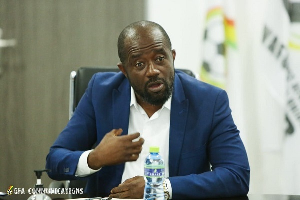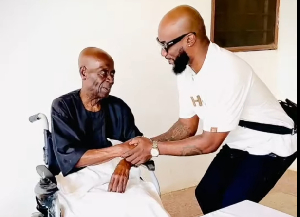Samson Lardy Anyenini has indicated that answers by Minister-nominee for National Security, Albert Kan-Dapaah, when he appeared before the Appointments Committee as part of his vetting shows that he has not read the constitutional mandate of the Auditor-General.
According to Samson Lardy Anyenini, even though the mandate of the Auditor-General does not entirely fall under his ministry, Kan-Dapaah has a lot of expertise in the area of accounting, and hence should not have made such a poor judgement about the question on why the Auditor-General was forced to proceed on leave.
When asked by the Host of Good Evening Ghana if asking about the Auditor-General at the Appointments Committee was a legitimate question for a National Security minister nominee, Samson Lardy Anyenini, the GJA Journalist of the Year 2019 noted that the members of the Appointment Committee realised that he had a lot of expertise and so they decided to spend time on issues of the Auditor-General.
Albert Kan Dapaah, when he appeared before the Appointments Committee on Wednesday, February 10, indicated that the independence of the Auditor-General is “not personal” to the Auditor-General but belongs to the Audit Service.
He submitted that the Auditor-General’s reports must be approved by Parliament before the Auditor-General could issue disallowances and surcharges.
“But this was where he [Kan-Dapaah] disappointed me the biggest (sic). I think that he ought to be told to revise his notes about [issues of the Auditor-General],” Samson Lardy Anyenini offered.
“The Auditor-General is accountable to us…and if he is supposed to make charges and disallowances, he must not take your [Parliament’s] say.”
Kan-Dapaah illustrated his argument with an example of a father’s permission being required before the conduct of his erring son is impugned by an auditor.
OccupyGhana, a Civil Society Organisation has also disagreed with Kan-Dapaah's position.
According to the group in a statement, “there is nothing in the Constitution that supports that claim that parliament must approve the Auditor-General’s reports before the Auditor-General can exercise his powers of disallowance and surcharge”.
The group added that all the Constitution says is that the Auditor-General should “submit” his report to parliament and then “draw attention to any irregularities” or any other matter he deems fit. Submitting a report and drawing attention to irregularities does not mean that parliament’s prior approval is required before the Auditor-General exercises his constitutional powers of disallowance and surcharge.”
The group further stated that Kan-Dapaah’s position does not also find support in the Audit Service Act. We note that section 17(7) of that Act says: “The Auditor-General may with the prior approval of Parliament revoke any surcharge made under this section.”
General News of Friday, 19 February 2021
Source: www.ghanaweb.com

















